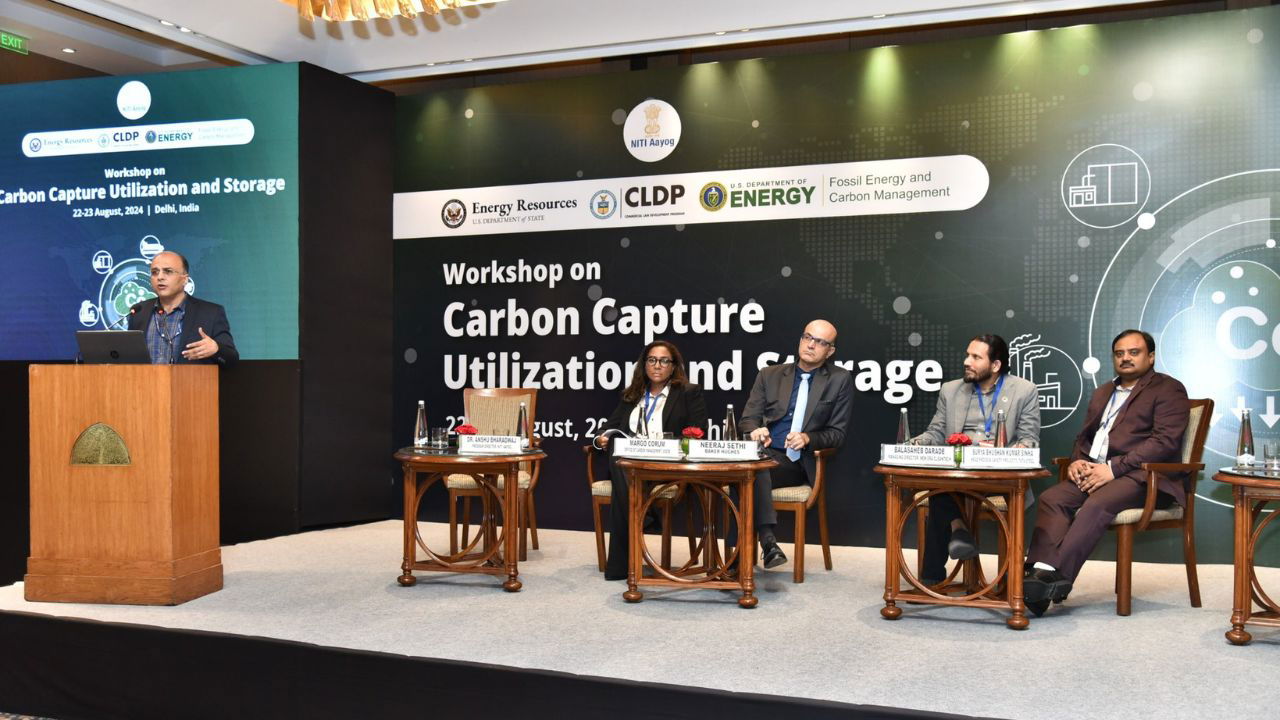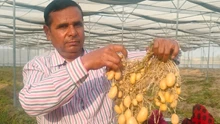
A two day workshop was held on the “Legal & Regulatory Frameworks and Technical Considerations for Carbon Capture Utilization and Storage (CCUS)” on 22nd -23rd August 2024 at The Oberoi, New Delhi. The workshop was jointly organised by NITI Aayog, Govt of India, US Department of State’s Bureau of Energy Resources, US Department of Energy’s office of Carbon Management and US Department of Commerce’s Commercial Law Development Program.
The workshop saw participation by senior dignitaries including HE Eric Garcetti, Ambassador, US Embassy, David Turk, Deputy Secretary, US Department of Energy, Tarun Kapoor, Adviser to PM, Suman Bery, VC, NITI Aayog, Dr. VK Saraswat, Member, NITI Aayog and Pankaj Agarwal, Secretary, Ministry of Power.
CCUS offers a unique set of tools for decarbonizing hard-to-abate industries crucial for India's economic growth, such as steel, cement, chemicals, and fertilizers, which heavily rely on fossil fuels. It enables a cleaner coal gasification economy, allowing for the more sustainable utilization of India's vast coal reserves. CCUS also supports the hydrogen economy by enabling blue hydrogen production - paving the way for a broader transition to green hydrogen based on renewable energy. Furthermore, CCUS can create new economic opportunities by establishing new industries and markets.
NITI Aayog has constituted four technical inter-ministerial committees on standards, storage, transportation and utilization of CO2. The committees are tasked with preparing a robust policy framework to address the challenges related to CCUS implementation in India, including technology readiness, high upfront capital costs, lack of infrastructure for CO2 transportation and storage, regulatory gaps, and public acceptance issues. NITI Aayog and US agencies are cooperating on various aspects of CCUS under the work plan on CCUS technical cooperation.
HE Eric Garcetti, Ambassador, US Embassy in his opening remarks, recapitulated long standing US-India association and the potential multiplicative effect of this partnership. He rephrased CCUS abbreviation as “Collaboration and Coordination with the US” highlighting the spirit of this partnership. Suman Bery, VC, NITI Aayog talked about NITI’s ongoing efforts in developing pathways for India’s Net Zero 2070 that balance the imperatives of employment, growth and environmental sustainability and examines the role of different technologies and associated costs.
Dr. VK Saraswat, Member, NITI Aayog highlighted the urgency on developing CCUS technology to achieve India’s net zero target. He mentioned the learnings from various pilot projects undertaken by industry partners including NTPC, OIL, ONGC, etc. He also shared the country’s deep commitment to mitigating climate change and highlighted that India is on track to achieve its NDCs.
Pankaj Agarwal, Secretary, Ministry of Power stressed the need to address the energy trilemma. He highlighted the role of domestic sources to fuel India’s growing demand, and deployment of efficient technologies like Ultra Supercritical (USC) and Advanced Ultra Supercritical (AUSC) that should be coupled with CCUS to achieve climate commitments. Tarun Kapoor, Adviser to PM concluded by recognising the growing energy demand in India driven by Viksit Bharat 2047 ambition. He highlighted the need for concerted global efforts towards development of CCUS.
The two day workshop saw sessions on Key Legal, Policy, and Regulatory Issues for CCUS, International Standards, Business Case & Early Opportunities for India and CO2 technologies and their potential in various fields, Carbon Source and Sink Mapping, Storage Pilots, Hubs and Clusters (Carbon Valleys) and R&D Cooperation on Carbon Management.










